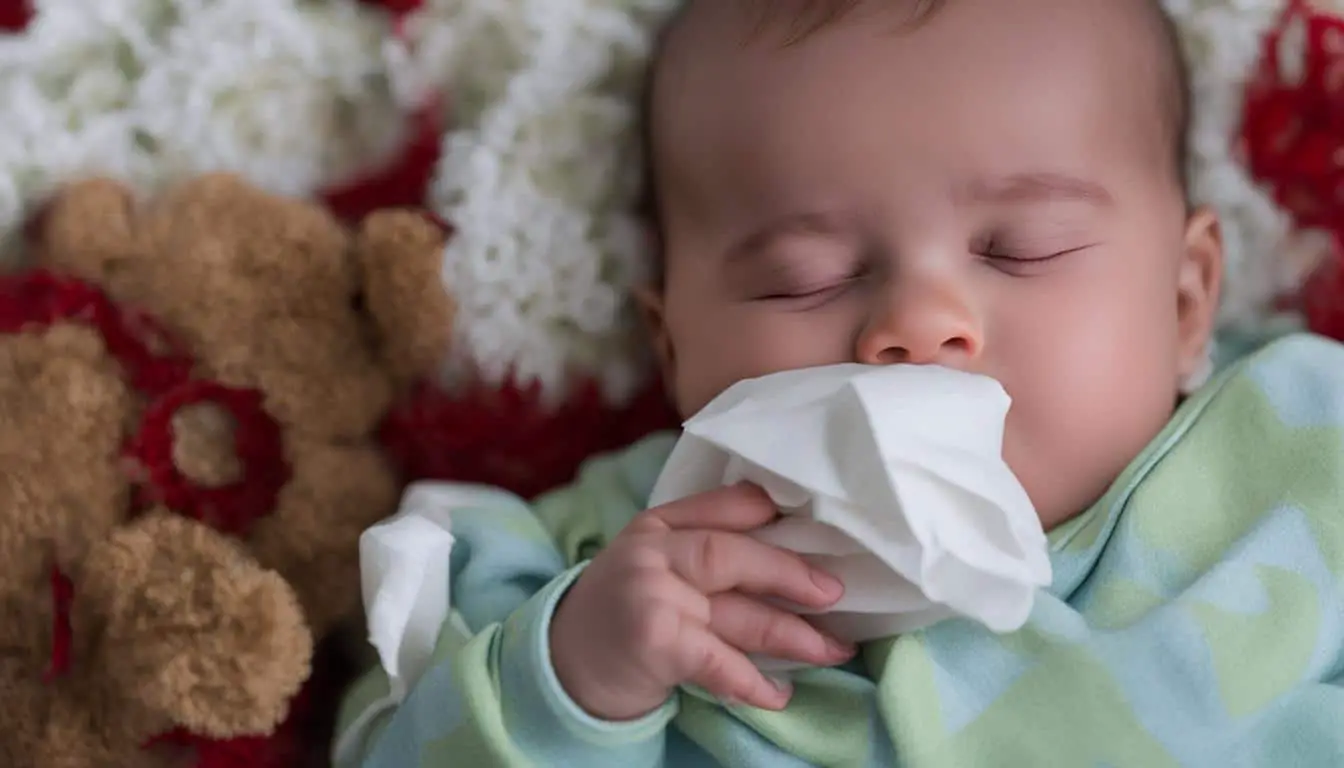
Navigating Your Baby’s First Cold: Tips and Tricks
As a parent, one of the challenges you may face is managing your baby’s first cold. Infants are more susceptible to getting sick because their immune systems are still developing. Without the antibodies to fight off most colds and infections, babies can experience several bouts of illness in their first year alone.
But don’t worry, there are steps you can take to make those sick days more bearable for both your baby and yourself. From enhancing your baby’s immunity through breastfeeding to maintaining good hygiene by washing hands regularly, there are simple yet effective ways to manage your baby’s first cold.
Following the recommended vaccine schedule and keeping your baby’s environment clean are also crucial in reducing the risk of serious illnesses. By being prepared and taking proactive measures, you can help your baby navigate their first cold with minimal discomfort.
Key Takeaways:
- Infants are more susceptible to getting sick due to their developing immune systems.
- Breastfeeding can enhance your baby’s immunity.
- Maintaining good hygiene, such as washing hands regularly, helps prevent the spread of germs.
- Following the recommended vaccine schedule is essential for protecting your baby from serious illnesses.
- Keeping your baby’s environment clean reduces the risk of infections.
Soothing Your Sick Baby: Tips for Comfort
When your baby is sick with a cold, providing comfort and relief can help them feel better and make the recovery process more manageable. Here are some tips to soothe your sick baby:
- Use steam: Steam can help loosen nasal secretions and ease breathing. Consider taking your baby into a steamy bathroom or using a humidifier in their room to create a moist environment.
- Try lukewarm baths: A lukewarm bath can help regulate your baby’s temperature and provide relief from discomfort. Just be sure to avoid hot water, as it can be dangerous for infants.
- Clear congestion: Suction devices and saline drops can be used to clear congested nasal passages, allowing your baby to breathe easier. Be gentle when using these tools to avoid irritating your baby’s delicate nasal tissue.
- Consider diaper cream: Homemade diaper cream or athlete’s foot cream can help provide relief for diaper rashes caused by acidic stools or yeast infections. Consult with your pediatrician before using any new products on your baby’s skin.
It’s important to note that not all suggestions for soothing a sick baby are effective or safe. Avoid raising the mattress or applying Vicks to your baby’s feet, as these remedies may not provide any real benefits and could potentially be harmful. Always consult with your pediatrician if you have any concerns or questions about comforting your sick baby.
Remember that each baby is unique, and what works for one may not work for another. It’s essential to observe your baby’s cues and adapt your soothing techniques accordingly. Providing a calm and loving environment, along with plenty of rest and fluids, can go a long way in helping your sick baby feel more comfortable and recover quicker.

Table: Safe and Unsafe Soothing Techniques for Sick Babies
| Soothing Techniques | Status |
|---|---|
| Raising the mattress | Unsafe |
| Vicks on the feet | Unsafe |
| Steamy environment | Safe |
| Lukewarm baths | Safe |
| Nasal suction devices | Safe |
| Saline drops | Safe |
| Homemade diaper cream | Safe |
What to Expect and How to Manage Your Baby’s Illness
As parents, it’s important to be prepared for the inevitable – your baby’s first illness. During their first cold and flu season, babies are more vulnerable to infections due to their developing immune systems. This means that they may experience multiple colds and illnesses, especially if they attend daycare or are exposed to large groups of children. Understanding what to expect and how to manage your baby’s illness can help you provide the best possible care.
It’s essential to differentiate between teething symptoms and illness symptoms. While a runny nose and low-grade fever are common during teething, higher fevers and persistent coughing may indicate an illness. If you’re unsure, don’t hesitate to consult your pediatrician for a thorough examination and peace of mind.
During your baby’s illness, it’s crucial to prioritize their comfort and safety. Ensure they stay hydrated by offering breast milk or formula frequently. Breastfeeding is particularly beneficial, as it enhances their immunity and provides much-needed nutrients. Additionally, maintaining a clean and germ-free environment can help reduce the risk of serious complications.
Remember, managing your baby’s illness is a team effort. Seek support from other parents, healthcare professionals, and trusted sources of parenting advice. By staying informed and prepared, you can navigate your baby’s first illness with confidence and provide the care and comfort they need.
FAQ
How can I enhance my baby’s immunity to prevent frequent colds?
Breastfeeding is a great way to enhance your baby’s immunity as it provides essential antibodies. Additionally, make sure to maintain good hygiene by washing your hands regularly and keeping your baby away from sick individuals.
What can I do to provide comfort and relief when my baby has a cold?
Steam from a shower or a humidifier can help loosen nasal secretions. Lukewarm baths can regulate your baby’s temperature. Suction devices and saline drops can clear congested nasal passages. Homemade diaper cream and athlete’s foot cream can provide relief for diaper rashes caused by acidic stools or yeast infections. Avoid suggestions like raising the mattress or applying Vicks to the feet as they may not be effective or safe for babies.
Why do babies get sick more often than older children and adults?
Infants are more susceptible to getting sick because they don’t have the antibodies to fight off most colds and infections like older kids and adults do. Their immune systems are still developing, and they are more likely to be exposed to viruses, especially if they attend daycare or are in large groups of similar children.
How can I tell if my baby’s symptoms are due to teething or an illness?
While it’s normal for infants to have a runny nose and a low-grade fever while teething, higher fevers and coughing are more indicative of an illness. If you are in doubt, it’s always best to consult a doctor for a complete examination.
How long do illnesses typically last in infants?
Illnesses in infants can last longer compared to older children and adults because their immune responses are still establishing. It’s common for babies to experience multiple infections during their first cold and flu season, lasting up to ten days each.